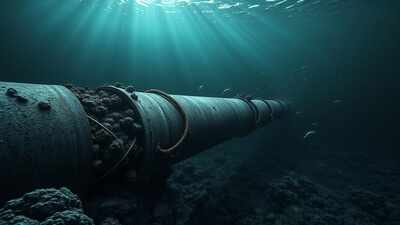ARTICLE AD BOX

Three years after the Nord Stream gas pipeline was blown up in the Baltic Sea, the first suspect has been apprehended. Acting on a European arrest warrant issued by the German Federal Public Prosecutor's Office, Italian authorities arrested a Ukrainian national suspected of coordinating the operation.
German Minister of Justice Stefanie Hubig described it as a "very impressive achievement."According to the Federal Prosecutor's Office, the man, whose name was given as Serhii K.*, belonged to the group that attached the explosive devices to the pipeline close to the Danish island of Bornholm in September 2022. The sailing yacht that was used for the operation departed from Rostock, Germany, and the Ukrainian man who has now been apprehended is believed to have been one of the coordinators.
Italian police arrested him near Rimini on the Adriatic coast on August 21.The suspect will now be brought to Germany to face a judge.Ukraine involvement?Ukraine has denied involvement. However, if Serhii K. is indeed behind the bombing, one particularly sensitive question is whether he had connections to the Ukrainian government or military leadership, and whether he may have even been acting on their behalf.This could seriously strain Ukrainian-German relations and call into question Germany's continued military and financial support for Ukraine in its war against Russia.
This is precisely what politician Sahra Wagenknecht said recently to the news agency Reuters."It is simply absurd that Germany is spending billions on aid for Ukraine but has never demanded any explanation from Zelenskyy. Questions about possible compensation should also be raised," said Wagenknecht, who has repeatedly opposed sanctions against Russia.The Sahra Wagenknecht Alliance (BSW) is a new splinter party that failed to win representation in the Bundestag in the February general election.Green Party politician and intelligence expert Konstantin von Notz warned against conspiracy theories and called for greater trust in the rule of law.After the arrest, Justice Minister Hubig emphasized that Germany's stance on Russia's war of aggression against Ukraine would remain unchanged: "We stand firmly with Ukraine politically."While Denmark and Sweden closed their investigations back in February 2024, Germany remains the only country still officially pursuing the case.What is NordStream?Nord Stream is a Russian-German mega-project that had a lot of opponents from the very beginning, including Poland, the US, the Baltic states, and, especially since the start of the war, Ukraine. That is why one question has remained central to the investigations: Who stands to benefit?A declaration of intent to build the Nord Stream 1 pipeline was signed in 2005 by the German government under then-Chancellor Gerhard Schröder (SPD) and the Russian government under President Vladimir Putin. The pipeline would bring Russian gas to Germany via the Baltic Sea, bypassing transit countries.
Initial proposals for the idea were made as early as the 1990s.The following year, Nord Stream AG was founded to plan and implement the project. The Russian company Gazprom and several European energy suppliers were involved, as other European countries besides Germany were also interested in receiving gas supplies.Construction of Nord Stream 1 began in 2010. The twin pipelines, each 1,224 kilometers long (761 miles), connect Vyborg in Russia with Lubmin in Mecklenburg-Western Pomerania, Germany.
The pipeline went into operation a year later.Peacekeeping through tradePlanning for Nord Stream 2 began in 2013. The new project consisted of two additional 1,250-kilometer-long pipelines that would essentially run parallel to the existing pipelines. The first contracts for Nord Stream 2 were signed in 2015. Once again, the Russian state-owned company Gazprom and several European energy providers were involved.
Just a year earlier, Russia had annexed the Ukrainian peninsula of Crimea.
For then-Chancellor Angela Merkel (CDU), that was no reason to stop the project.From the beginning, Ukraine, Poland, and the Baltic states voiced growing concerns about the security risks the pipeline presented. The EU also issued warnings.After Donald Trump was elected for his first term as president in the US, opposition to Nord Stream also grew.
Trump warned Germany about becoming too dependent on Russian energy supplies.But the German government ignored all concerns and not only portrayed Nord Stream as the answer to Europe's energy security needs, but also as a form of peacekeeping through trade.Construction of Nord Stream 2 began in 2018 and was completed in 2021. But due to Russia's attack on Ukraine on February 22, 2022, then-Chancellor Olaf Scholz suspended the certification of Nord Stream 2, effectively halting the approval process.However, Nord Stream 1 continued to supply gas to European states, although in smaller amounts due to EU sanctions against Russia.But then, allegedly because of maintenance work, Russia shut down Nord Stream 1. Gazprom blamed a defective turbine for the continuation of further delays.Pipeline explosions lead to many theoriesOn September 26, 2022, both pipelines of Nord Stream 1 and one of the two lines of Nord Stream 2 blew up near the Danish island of Bornholm.
Germany, Denmark and Sweden launched investigations.Over time, various theories emerged about who might be behind the attacks. US investigative journalist Seymour Hersh claimed that the US and Norway were responsible for blowing up the pipelines. However, he was unable to provide any evidence.One Ukrainian suspect — Volodymyr Z., reportedly a diving instructor — was last known to be in Poland as of August 2024, but evaded arrest by fleeing to Ukraine.
The Polish prosecutor's office attributed the failure to a procedural delay caused by a formal error: They claimed German authorities had not entered his name into the register for individuals sought under a European arrest warrant.It was not until August 21, 2025, that the first suspect was arrested by the Italian Carabinieri on the Adriatic coast after the German Federal Prosecutor's Office issued a warrant for the Ukrainian Serhii K.What could happen next?Nord Stream still remains important and could become part of a US-Russian agreement to end the war in Ukraine.Back in March, Russian Foreign Minister Sergey Lavrov said on state television: "Nord Stream is being discussed."



.png)
.png)
.png)
















 2 hours ago
3
2 hours ago
3









 English (US) ·
English (US) ·